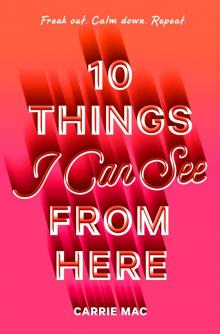- Home
- Carrie Mac
The Gryphon Project Page 2
The Gryphon Project Read online
Page 2
Maybe things would’ve turned out differently if he’d been there.
PHEE DIDN’T REMEMBER watching the baseball practice, or the fact that it had started to rain. When she finally broke from going over what she knew of her first death, she was walking across the field with Nadia and the boys, in the direction of the restaurant where they often ate after. She pulled up the hood of her jacket and wiped her cheeks, wet from the summer drizzle. Tariq glanced back at her as she did. He gave her a look that silently asked if she was all right, so she gave him a little nod back. He never said much, but he didn’t have to. Phee wished that Gryph still cared, or acted as if he did.
She cornered her brother as he held the restaurant door open for the others. Phee hung back until it was just the two of them.
“You know what day it is?”
“Saturday.”
“But what’s special about it?”
Gryph shrugged. “Enlighten me. You clearly want to.”
“It’s my deathday.”
“Right.” Gryph rolled his eyes. “You know Mom and Dad think it isn’t healthy when you dwell on it. Guess what?”
Phee waited for the inevitable.
“You’re dwelling.” He turned to go into the restaurant, but Phee grabbed his arm.
“Wait. Gryph, please.”
He let the door close, and it was once again just the two of them in the rain. “Go.”
“Did Mom and Dad talk about me? When I was dead?”
“Of course they did. Your recon was pretty much all they talked about.” Gryph glanced inside, where the others had set up at a table near the window. “Okay?”
“Did you miss me?”
“I guess. Although you weren’t much fun to begin with, being so sick. And just a baby.”
“Did you understand, though? Did you get what was happening?”
“Sure I understood.”
But how could he have understood? Phee tried to imagine their little sister at three, remembering. It didn’t seem likely. “You were only little.”
“I remember what it’s like to be three,” Gryph snapped. “You don’t. So I’ll decide what I do and don’t remember, if you don’t mind.” He flung open the door to let a family trickle out, the two little kids squealing at the rain, the parents arguing about the bill. Phee watched them dash across to the train station, all of them in short sleeves, running from the rain. When she turned back, Gryph had gone inside. She watched through the window as he slid into the booth, all grin and charm for his friends. And there was Phee, outside as usual, in more ways than one.
IF IT HADN’T BEEN for Nadia’s stupid card, Phee could’ve slid through the day in blessed denial. But her first death still weighed heavily on her that night. She wandered around the house—the same house in which she’d died that first time—finally stopping in the door of the laundry room, where her mother was folding a load out of the dryer.
“Know what day it is?” Phee leaned her head against the doorframe, the weight of the day giving her a headache.
Eva folded one of Fawn’s pink shirts and set it on a pile. “Of course.” She went to the door and pulled Phee into a tight hug. “Of course I do.”
“Do you think Gryph remembers when it happened?”
“Sure.” Her mother nodded as she went back to the laundry. “He’s always had a brilliant memory.”
That stung. But Phee knew her mother didn’t mean it to.
“I used to find him in your room, looking in the crib. ‘Where my sister?’ he’d ask, ‘Where my Phee go?’”
“What did you tell him?”
Eva picked up one of Fawn’s little sweatshirts and hugged it absent-mindedly to her chest. “I told him that you’d died. I told him you’d be back when the scientists were finished reconning you.”
“Did he understand what that meant?”
“Well, not really. I explained that reconning was something that scientists did to bring people back from the dead, when they decide that it’s not their time to go. But then your father complicated matters by bringing God into it. He told Gryph that God was the one who decided when it was people’s time to die or come back.”
Phee had heard this all before, but she listened as if for the first time. Each word her mother spoke of that time brought Phee closer to the little girl she’d been and lost. Twice.
“Even though we’d agreed on how to explain it to Gryphon.” Eva smiled. “But you know how your father is. We got into quite the discussion, as I recall. We were walking Gryphon to the park, maybe a day or two after you’d died. I was so mad that his all-powerful God hadn’t made you stronger to begin with. And he was frustrated that I couldn’t allow God to be fallible.” Eva gave a small, sad laugh and hugged the sweatshirt even tighter to her. “And then the next thing we knew Gryph had bolted ahead of us and had climbed to the top of the swing set. Your dad grabbed his ankle just before he would’ve fallen. It wasn’t a good day.” Eva closed her eyes, remembering. “Not a good day at all.”
“Mom,” Gryph said from right behind Phee. “You always forget to mention Riley in that story.”
Phee spun around. How long had he been standing there? Gryph grinned at her. “What?”
“You’re eavesdropping!”
“It’s my house too.”
“Only when you feel like it.”
“Whatever.” Gryph shrugged. “But Riley was there too. He barked, remember?”
“He did,” Eva said. “You’re right.”
“He barked, and that’s what made you look up from your fight—”
“Discussion, Gryph.”
“Fight, Mother.” Gryph cocked his head at Eva. “He was just a puppy, but he was smart. He knew I was going to fall.”
Hearing his name, the big old mutt pushed himself off his comfy bed by the kitchen door and hobbled over to the laundry room, his tail wagging. Riley leaned against Phee’s leg and gazed up at her, as if silently recounting his own version of events from that day so long ago.
THE RACE
Shortly after the laundry room discussion, Eva’s pager went off and she hurried to the house of one of her patients in the next suburb. The family’s infant son had been fine until a few weeks earlier, but then he fell suddenly and terribly ill. Eva was part of a team of doctors trying to keep him alive until he was old enough to be reconned. She didn’t come home again until the next morning, and Phee could tell just by looking at her that the baby boy had died.
It was Sunday, the morning of Gryphon’s big downhill race, so Phoenix and her sister were having an early breakfast while Oscar bustled about, trying to get out the door to deliver the sunrise sermon. Normally his lay minister did the early one and he did the later one, but he wanted to be there for Gryph’s race, so he’d switched. All three of them fell silent when Eva walked in the door.
“We lost him. I’m just devastated.” Eva dropped her purse and slumped into a chair at the table. “Those poor parents.”
Phoenix glanced at her father. After Phoenix’s first death Eva had quit her general practice and gone back to university to specialize in sick babies. Oscar had never objected, after that “discussion” in the park, not even once. He’d even supported the family with his modest minister’s wages while she was at school, and had agreed to remortgage the house to secure her loan for starting up the neonatal clinic. But he hadn’t agreed with her ideas. He still stood by the decision of the Congress. To this very day.
Oscar tugged his neatly trimmed beard. He was stuck at the coffee pot, thinking hard, his brow furrowed. One hand on the carafe, the other still tugging his beard. After a moment, he relaxed enough to pour the coffee and set it in front of his weary wife with a gentle kiss on the forehead. He placed his hands on her shoulders and gave her an affectionate—if somewhat distracted—squeeze.
“I’m sorry, Eva. I know you thought he’d make it. I had been praying.”
“Thank you.”
“I prayed too,” Fawn piped up, whether or not it was
true. At six, she had a little bit of a lying problem.
“Thanks, Fawn, honey.”
“Will they have another one?” Phoenix stared at her bowl of cereal. The oat squares were soggy and separating. The milk was turning brown. She pushed the bowl away, suddenly sickened by it.
Would the reminders never end? Whenever one of Eva’s babies died too soon, Phoenix felt as if her heart had been drop-kicked into the stratosphere. That could’ve been her fate. She too might never have lived to see her first birthday, let alone her fifteenth.
“I don’t know,” Eva said with a sigh. “I just don’t know. Something changes in you when a baby dies. Permanent or not. A part of you dies too.”
“We’re blessed.” Oscar bent and kissed Eva’s hair. “Our Phoenix is still with us.”
Eva closed her eyes and nodded, putting her other hand over Oscar’s. Fawn decided this was a game and stuck her hand on top of the pile. Eva smiled and moved her bottom hand to the top, and then Oscar did the same, and then Fawn again, laughing, her red bangs falling across her face, until they were all slapping each other’s hands and it was just Phoenix sitting there with the dead baby and her dead self on her mind.
Later, when they left for Gryph’s race, Eva asked them not to mention the baby’s death. Gryph had slept over at Saul’s yet again, so had no idea about his mother’s long, hard night.
“I don’t want to spoil his special day,” she said as they headed to the train. Fawn held one of her hands, and one of her father’s. She skipped along, hardly seeming to be bothered by the sad news. Death had really not touched Fawn’s own life directly, so Phee figured that it was hard for Fawn to actually connect it to herself. Not so with Phoenix. Her whole life—or what she could remember of it—she’d held each story of a baby gone before recon age as if they were bricks in her arms, weighing her down. She followed her parents across the green, giving her father a smile when he turned to wink at her.
“Okay, Phee?”
She nodded. He let Fawn skip ahead with Eva while he hung back to walk with Phoenix. “Are you sure?”
“Yes, Dad.”
“It’s understandable that this kind of thing would upset you.” He took her hand in his. It felt awkward. She was too old, yet it felt good too, as if she were little again.
“I’m fine. Just sad about the baby.”
“Me too,” he said as they reached the train station. “And that’s okay.”
IT WAS ALWAYS STRANGE to enter Winter Park when it wasn’t remotely cold out. It was the middle of June, and a beautiful hot sunny day outside. Phee was glad she’d stuffed a ski jacket in her pack, because as they made their way to the downhill section of the sprawling indoor winterized complex, she was freezing. The sun still shone through the clear roof, but the temperature inside was positively arctic.
Phoenix didn’t sit with her parents and Fawn for the race. They were far up the bleachers to the left of the man-made hill, with a better view of the top half of the slope. Phoenix was down with Nadia and the boys, closer to the finish line.
“Did Gryph stay over at your place last night?” she asked Saul.
“You know he did. Why ask?”
“I don’t know. Just wondering. He’s hardly ever home anymore and—”
“And I”—Nadia cut Phee off and planted a kiss on Saul’s lips— “would like you to myself every once in a while on a Saturday night.”
“I’d like Gryph to myself every once in a while too,” Huy joked. He’d been in love with Gryph since probably the fifth grade or, in other words, when he and the others realized he was “different,” in that he liked boys. Or one in particular. Gryph.
“Gross,” Neko said with a sneer.
Tariq silenced him with one of his looks. The boys didn’t have a problem with Huy’s being queer, and if Neko was going to last very long in their midst, he’d have to be okay with it too.
“Sorry,” Neko muttered.
Another sharp look from Tariq prompted Neko to face Huy directly and apologize for real. “Sorry, Huy.”
But Huy wasn’t paying attention. He leaped up to watch Gryph as he shot out of the starting gate and cut down the slope. He was so fast that Phee could hardly keep her eye on him. He devoured the entire course with his customary precision, as if his snowboard were simply an extension of his body, and the hill was his alone and always had been. For almost the entire course.
Suddenly, mere seconds before he would’ve been an easy first across the finish line, he slowed. It was almost imperceptible, but Phee saw it in the sudden slackening of his form, a softening of his posture. Tariq caught it too—she could tell by the way his eyes shifted and he frowned. Huy was too busy cheering to notice. Neko and Saul didn’t look as if they’d spotted the shift, and neither had Nadia. She was nestled under Saul’s arm, inside the warmth of his jacket, and wasn’t even watching the race.
“Come on!” Huy yelled, always Gryph’s most enthusiastic cheerleader. He obviously thought Gryph still had it nailed. “Go! Go!”
“Go, Gryphon!” Neko pumped a triumphant fist in the air.
With a flat expression, Tariq watched Gryph carefully. He knew Gryph had blown it.
In the end, Gryph’s delay had held him back just enough for the guy who’d been in second place to gain a tiny lead. Only seconds apart, the two of them crossed the finish line. Gryph took second place.
“No!” Huy yelled as the others grumbled.
“What just happened?” Phee marvelled out loud. “He had it! He had it all along! He gave it away. Did you see that?”
The winner, whooping with joy, threw his helmet into the air. The media members who had been flanked along the fence rushed him with their cameras.
Gryph gave a small wave to the crowd, and they erupted with cheers. No matter what, he was still their favourite. But not the winner. Not today anyway. What would Oscar say if Phee suggested that Gryph didn’t care about winning anymore? Would that make him realize that something was wrong? That his son and proud winner would settle for anything less than best?
Chrysalis would not be okay with second best. Phee could see Gryph’s Chrysalis agent making the phone call to his higher-ups from the VIP box, his posture communicating his disappointment keenly.
BUT GRYPH was a crowd-pleaser, nonetheless. A section of the crowd behind him, made up of mostly teenage girls, had placards that spelled out W-E L-O-V-E G-R-Y-P-H-O-N, and they did the wave with them, chanting his name. His fans clambered to get near him, pods ready for signing, digicams held high, snapping pictures blindly. A crush of more girls headed for him as he switched his goggles for his sunglasses. There were the TV crews, the journalists, more fans, his Chrysalis agent, his agent’s assistant, his coach, his teammates. Everyone was always rushing to Gryph, as if he were just a mirage and would vanish before they could quench their thirst.
Gryph’s agent said something to him, but Gryph, standing on tiptoes and scanning the crowd, only half listened to Lex.
“He’s looking for you guys.” Phoenix nudged Tariq, who was busy texting.
“Let’s go, then,” he said as he slid his phone into his pocket.
The group pushed through the crowd, Nadia clinging to Saul, her hand tight in his.
“I don’t know why I let you drag me to these things.” She frowned at Phoenix.
“You love it,” Phoenix said, though she knew full well that Nadia did not love the cold of Winter Park, the unpredictable energy of crowds in general, or watching Phoenix’s brother compete in any of the many sports he was a pro at. But she did love Saul, so she went where he went.
Closer now, Tariq locked eyes with Gryph over the sea of heads. They both nodded, just the slightest nod, but it said so much. Phee always marvelled at this, how the boys had an entire private language of looks and gestures. Gryph collected his snowboard, gracefully but firmly untangled himself from his adoring entourage, and slipped through the door leading to the corridor of change rooms in the basement of the complex.
&
nbsp; “Saul, Huy,” Tariq said. “You go ahead.”
Nadia kissed Saul and reluctantly let go of his hand. “Love you, baby.”
“Me too,” Saul said with a blush, as he caught up with Huy, who was already bullying a path through the throng. This didn’t come easily to Huy, who was gentle by nature and more concerned with the cut of his shirt than the task of being bodyguard, which is exactly why Gryph gave him the job. To harden him up. Years of this, and he was still the same soft-spoken sweetheart he’d been when he played with Phoenix and her dolls when they were kids. But he’d gotten bigger and bulkier—he could throw a mean right hook when necessary— and had traded pretending with dolls and tea sets for pretending to be meaner than he was. It was all a facade, though, for Gryph.
Phoenix and Nadia followed next, with Tariq and Neko bringing up the rear. The boys always sandwiched the girls like that, because Nadia hated crowds and got nervous if she was surrounded by strangers. It irked Phee that she was lumped in with Nadia, when she was more than capable of looking after herself. She didn’t argue the matter, though, because it was a brotherly, protective gesture, and she had to admit that it felt nice to be taken care of.
THEY CHECKED IN with security and got their guest badges, then found Gryph’s dressing room, the big one with the imaging wall and mini-bar and ambient stereo; it even had a little bedroom with an ensuite bathroom. Gryph was in the shower there, so his agent’s assistant passed around hot chocolate and they sat down to wait. Saul pulled a flask from his pocket and poured a shot of whisky into his and Huy’s drinks and Neko’s too, though he was only fourteen. But he didn’t spike Tariq’s drink. He didn’t drink alcohol. Tariq’s dad drank to the point of oblivion most nights, and Tariq didn’t want to end up like him. Gryph never drank either, because of the urine and blood tests, but the boys didn’t bug him about it. Even though they ribbed Tariq on the subject often enough.

 Wildfire
Wildfire The Opposite Of Tidy
The Opposite Of Tidy Beckoners
Beckoners 10 Things I Can See from Here
10 Things I Can See from Here The Gryphon Project
The Gryphon Project The Way Back
The Way Back Pain & Wastings
Pain & Wastings